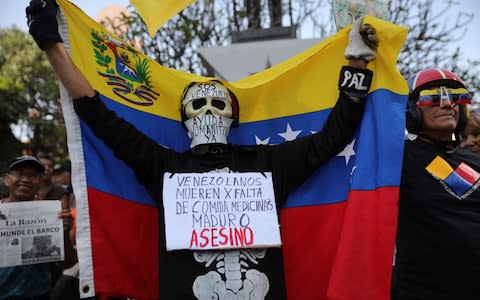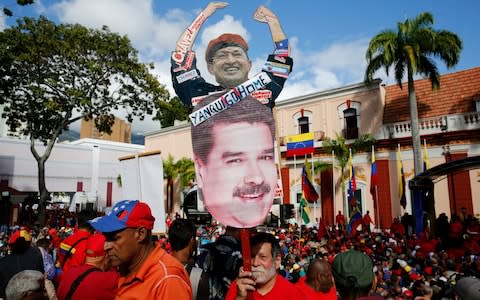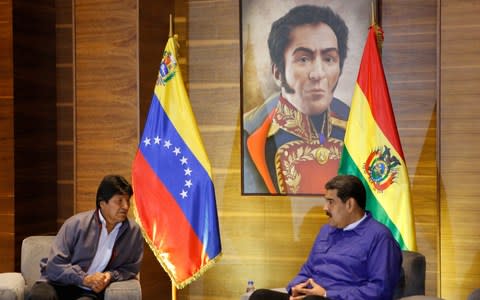Venezuela crisis: Nicolas Maduro on brink as military top brass turn against him

Thousands of protesters have taken to the streets of Caracas to back opposition leader Juan Guaido's calls for early elections as international pressure increased on President Nicolas Maduro to step down.
Mr Maduro addressed a rally in Caracas on Saturday and proposed bringing forward parliamentary elections, scheduled for 2020, to this year, as he sought to damp down demands for presidential elections.
"You want elections? You want early elections? We are going to have parliamentary elections," he said. "There is no dictatorship in Venezuela, nor will there be."
He said the constituent assembly, which he controls, would debate ordering elections in the rival national assembly, which is opposition controlled and headed by Mr Guaido.
The suggestion will likely have little impact, however, as he ignored Mr Guaido and his supporters' demands to resign, and stopped short of the four EU nations' demand for presidential elections.
It certainly had little impact on the tens of thousands of anti-Maduro demonstrators in the streets.
Protests were held across the country, and remarkably, as the day edged towards evening, there was no reported violence, and no tear gas fired.
Wearing t-shirts saying "Let's take back our country" and holding aloft banners and placards criticising Mr Maduro, they processed through Caracas demanding change.
Nakary Coelho, 28, broke down in tears, Venezuelan flag around her neck, as she told why she was supporting Mr Guaido.
"I want my country to be free, and I want freedom to be the way here again," she told The Telegraph.
"There is too much suffering, and we have to bring democracy back. Today we are doing it."

Bekis Seijas, a 60-year-old retired health ministry employee, said he and his two children were the only members of his family not to have fled the country.
"We need humanitarian aid," he told The Telegraph. "We need medicines, we need food, and this government blocks everything. That's why I'm here."
Mr Guaido announced on Twitter that humanitarian aid was on its way. The move is being seen as a test of whether the military remains loyal to Mr Maduro, and turns it away, or defies the commander in chief and helps the people.
"You, soldier... have the decision in your hands" to allow it in or not, said Mr Guaido.
In the northwestern city of Barquisimeto video on social media appeared to show riot police refusing to repress protesters, and walking away from the demonstrations.
One officer hugged a protester.
The demonstrations came as a general from the Venezuelan air force announced he no longer recognises Mr Maduro as the country's president, in what appears to be the highest ranking military defection to hit the regime.
Major European countries have set a Sunday deadline for Mr Maduro to call snap presidential elections. Failing that, they will join the United States in recognising Mr Guaido, leader of the national assembly, as Venezuela's interim president.
His announcement on Saturday does not meet their demands.
"Maduro's tyranny must end and must end now," said Mike Pence, the US vice president, at a rally of exiled Venezuelans in Miami on the eve of the protest.

Mr Guaido in an interview with Italian newspaper La Stampa said he wanted the Vatican to intervene in his favour.
"We hope to soon hear a pronouncement by the pope," he said.
But the Argentine-born pontiff said a few days earlier that, although he is terrified there could be a bloodbath in Venezuela, his pastoral role does not let him take sides.
Mr Guaido's call for a massive show of popular support coincides with a huge pro-Maduro demonstration.
The ruling Socialist party celebrated the 20th anniversary of the rise to power of Hugo Chavez, Mr Maduro's deceased predecessor, on Saturday.
Mr Maduro told the crowd that the armed forces were “the spinal column” of the country, and that he had every faith in them.
“If Venezuela wants a future, peace, then we must preserve our country’s integrity,” he said, praising his armed forces.
“If you want peace, prepare yourself to defend it. We are a peaceful population. But we are warriors. The United States empire threatens us every day. We don’t want another Vietnam. And I have a message for the people of the United States: stop the madness of Donald Trump.”
Clashes last week around the country left some 40 people dead, according to the United Nations.
Chavez, the army officer whose oil-fueled spending raised millions of Venezuelans out of poverty, assumed office as Venezuela's president February 2, 1999 at the head of a socialist movement.

His hand-picked successor, Mr Maduro, has presided over the oil-rich country's economic collapse and is widely denounced as a dictator for ruthlessly cracking down on dissent amid chronic shortages of food and medicines.
Mr Guaido, 35, is trying to force the socialist leader from power so he can set up a transitional government and hold new presidential elections.
The United States and a dozen Latin American countries rapidly recognised Mr Guaido after he declared himself acting president in a January 23 speech, posing a direct challenge to Mr Maduro's authority.
European Parliament politicians recognised Mr Guaido on Thursday as the acting head of state.
And four major European powers - Britain, France, Germany and Spain - have said they will do so if Mr Maduro fails to call presidential elections by midnight on Sunday.
The international heave against Mr Maduro's leftist regime came after weeks of behind-the-scenes diplomacy including secret talks in Washington between Mr Guaido and US officials.
"Nicolas Maduro will do well not to test the resolve of the United States of America," Mr Pence warned on Friday.
"Let me be very clear: this is no time for dialogue. This is time for action," the vice president said. "The time has come to end Maduro's dictatorship once and for all."

In a letter to the presidents of Mexico and Uruguay published Friday, Mr Guaido ruled out any negotiations with Maduro unless they "start the transition process, culminating in the holding of free elections."
Mexico's Andres Manuel Lopez Obrador and Uruguay's Tabare Vazquez have jointly called a conference in Montevideo next Thursday for "neutral" countries to discuss the crisis.
Previous negotiations all had the same "unsatisfactory result," Mr Guaido wrote.
"The dictatorship of Nicolas Maduro has not changed its position. They have mocked the Venezuelan people to their face."
The last 10 days of political upheaval have exacerbated economic meltdown in Venezuela, which has the world's largest proven oil reserves but has suffered hyperinflation and shortages of basic necessities.
The UN says 2.3 million people have fled the country, unleashing a migration crisis in South America.
Mr Guaido has acknowledged "clandestine meetings" with members of the armed forces and security forces, who he is trying to woo with an amnesty offer.
So far, the military high command has remained loyal to Mr Maduro.

